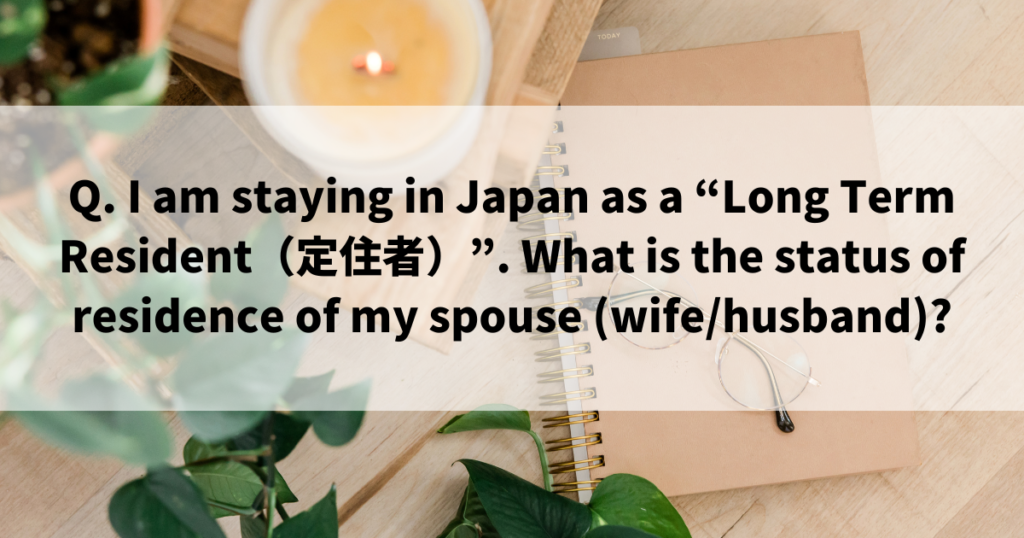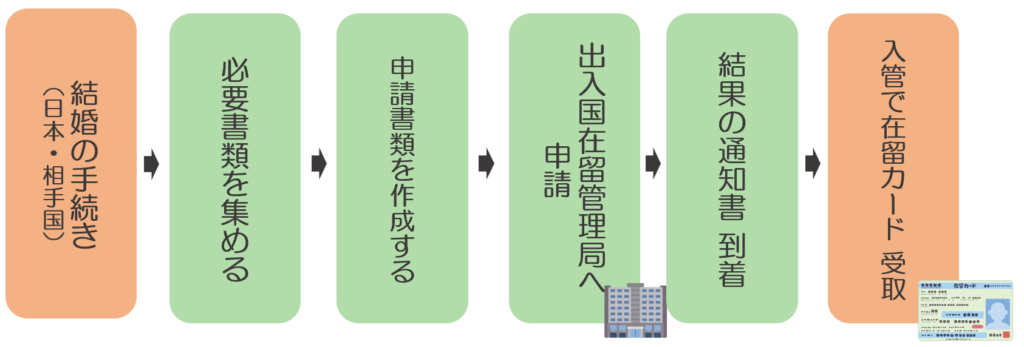
The spouse of a foreign national who is a Long-Term Resident in Japan may be eligible for Long-Term Resident status under certain circumstances. “Long-Term Resident” is classified as a status-based residence qualification, allowing for unrestricted employment. If you are currently residing in Japan under a different status of residence, transitioning to “Long-Term Resident” status may simplify your life in Japan. However, the screening process is highly rigorous, so you should prepare meticulously for it, considering your individual circumstances.
This article explains the “Long-Term Resident (Notification No. 5(告示5号))” status of residence and its application process.
Answer: The wife or husband of a Long Term Resident can stay in Japan as a Long Term Resident (Notification No. 5).

Those with the status of residence “Long Term Resident” can invite their spouse (wife/husband) to Japan. The family members of Long Term Residents will be granted the status of residence “Long Term Resident (Notification No. 5)”.
It is important to note that the status of residence that Long Term Resident family members apply for is “Long Term Resident”, not “Dependent(家族滞在)”. Spouses (wife/husband) who have obtained the status of residence of “Long Term Resident” are able to work without obtaining Permission to engage in activities other than permitted under the status of residence(資格外活動許可).
Pattern 1: If you want to invite your spouse (wife/husband) who is overseas
If your family members are overseas, they will need to apply for the “Long-term Resident” status of residence. The procedure for this is called the “Application for Certificate of Eligibility(在留資格認定証明書交付申請).” If a married couple is eligible for the “Long-term Resident” status of residence and plans to move to Japan together, they can apply for this status simultaneously. In such cases, a relative residing in Japan can submit the application on their behalf.
Pattern 2: Marrying someone who is already living in Japan
If you marry someone who is staying in Japan as a Long Term Resident, your spouse (wife/husband) can change their status of residence to Long Term Resident if they were staying in Japan with a different status of residence (the procedure is called “Application for Change of Status of Residence(在留資格変更許可申請)”).
As mentioned above, Long Term Residents can work without obtaining Permission to engage in activities other than permitted under the status of residence. There are no restrictions on the type of work, and it is also possible to work full-time.
3 points to keep in mind when applying for “Long Term Resident (Notification No. 5)”

This section explains the requirements for “Long Term Resident (Notification No. 5)”.
Point 1: The marriage relationship must be true.
For Long Term Residents, the marriage must be genuine.
A “marriage that is not genuine” is a marriage that is only for the purpose of obtaining a visa, and includes cases such as a sham marriage where the couple are not actually married, or a marriage that is effectively in a state of divorce but is continued for the purpose of obtaining a visa.
Compared to a work visa, the Long Term Resident visa has more relaxed requirements for permanent residency and Japanese citizenship (naturalization), and there are no work restrictions, so it is a “convenient status of residence”. For this reason, it is easy to misuse, and the Immigration Services Agency is particularly careful about this “fake marriage”.
For these reasons, when applying for Long-Term Resident status, you will be required to provide detailed information about your relationship in a questionnaire(質問書). This includes how you met, the development of your relationship, and the circumstances of your marriage. The purpose of this is to demonstrate that your marriage is genuine.
It may be embarrassing, but unless you are in a fake marriage, you should be able to provide a lot of information, so please fill in the details. In some cases, in addition to the content of the “Questionnaire”, you may also need to attach fairly private content such as phone records, chat and email correspondence, etc.
Point 2: A married life is based on mutual support and living together.
For the Long Term Resident visa status, there is no clear “annual income requirement”, but you will need to prove that you can live a stable life in Japan. Basically, it is important to show that you can live without running a monthly deficit based on the income and assets of the two of you. Whether the income is from the foreign national themselves, their spouse (wife/husband), or both (total), as long as you can expect to earn enough to live comfortably, there is no problem.
In some cases, such as when a married couple move their base of living to Japan together, they may be unemployed when they enter the country. If they have already received an offer of employment from a Japanese company and can expect to earn a sufficient income, this will not be a problem. Alternatively, if they are planning to look for work after arriving in Japan, they will need to be able to explain how they will cover their living expenses in the meantime. In this case, they will need to explain things such as their savings and any financial support they may receive from relatives.
When applying for “Spouse or Child of Japanese National(日本人の配偶者等)”, you will need to submit a “tax certificate” or “tax payment certificate”. Please be careful as failure to pay tax may be seen as an indication that the applicant does not have sufficient financial capacity.
In addition, “living together” is one of the key points for couples in the Immigration Services Agency. Nowadays, there are various ways for couples to live, but unless there are special circumstances, it will be difficult to obtain permission unless you are living together as a newlywed couple.
Point 3: Make sure you have all the necessary documents ready.
The initial screening for residence status primarily focuses on document review. At the time of application, there is no opportunity for you to explain your situation to the counter staff. If your application is rejected, you will be informed of the reasons for the rejection. However, explaining your situation at this stage will not result in the approval of your application. When you apply, you must be able to submit the necessary documents as attachments together with your application form.
The list of required documents on the Immigration Services Agency website is the minimum required to have your application accepted. In some cases, you may need to gather and submit more documents, but it is important to gather all the required documents without omission in accordance with the list of required documents first.
Understand the application process

When applying for Long Term Resident status, you must first confirm that you meet the requirements and gather the necessary documents, and then submit your application to the Immigration Services Agency that has jurisdiction over the area where you live.
Procedures for inviting a spouse from overseas – Application For Certificate of Eligibility –
The procedure for inviting a family member (spouse/partner) living overseas to Japan is called the “Application for Certificate of Eligibility”. This procedure is carried out by the person inviting them (the “Long Term Resident”) acting as an agent at the Immigration Services Agency. If both husband and wife are living overseas, a relative living in Japan can act as an agent to carry out the procedure.

Procedures for changing from another status of residence to “Long Term Resident” – Application for Change of Status of Residence –
If you want to change the status of residence of your family member (wife/husband) who is already living in Japan to “Long Term Resident”, you will need to apply for “Change of Status of Residence Permission”. This procedure is carried out at the Immigration Services Agency that has jurisdiction over the area where your Japanese family member (wife/husband) lives.

Required documents
| In the case of a spouse (wife/husband) |
|---|
| ・Application for Certificate of Eligibility/Application for Change of Status of Residence ・Passport (wife/husband) ・Residence Card (Long Term Resident) ・ID photo ・Marriage certificate and its Japanese translation ・Documents proving your expenses while in Japan (proof of income, enrollment, etc.) ・Letter of Guarantee(身元保証書) for Spouse (Long Term Resident)身元保証書 ・A copy of the residence certificate(住民票) that lists all the members of the household of the spouse (Long Term Resident) ・Questionnaire ・Documents that confirm communication between husband and wife (e.g. snapshots, call records, etc.) |
If you are applying as the spouse of a Long Term Resident, you will have to explain in considerable detail how you came to be married. This is because you will have to prove that you are not entering into a marriage of convenience. You will have to describe the details in a written questionnaire, but you will also have to submit a lot of supporting material, such as snapshots and phone records.
Apply to the Immigration Services Agency
Basically, applications are made at the Immigration Services Agency that has jurisdiction over the applicant’s place of residence, or the Immigration Services Agency that has jurisdiction over the place of residence of the foreign national or the applicant’s representative.
There are rules regarding where applications should be made, as follows.
the local immigration office that has jurisdiction over the place of residence or the place of residence of the representative applying on their behalf
[Application for Change of Status of Residence or Application for Extension of Period of Stay]The local immigration office that has jurisdiction over the place of residence
| Regional Immigration Office | Area of jurisdiction of the |
|---|---|
| Sapporo Immigration and Residence Office | Hokkaido |
| Sendai Immigration Bureau | Miyagi, Fukushima, Yamagata, Iwate, Akita, Aomori |
| Tokyo Immigration Bureau | Tokyo, Kanagawa Prefecture (Yokohama Branch Office has jurisdiction), Saitama Prefecture, Chiba Prefecture, Ibaraki Prefecture, Tochigi Prefecture, Gunma, Yamanashi, Nagano, Niigata |
| Nagoya Immigration Bureau | Aichi, Mie, Shizuoka, Gifu, Fukui, Toyama, Ishikawa |
| Osaka Immigration Bureau | Osaka, Kyoto, Hyogo (Kobe Branch Office has jurisdiction), Nara, Shiga and Wakayama Prefectures |
| Hiroshima Immigration Bureau | Hiroshima, Yamaguchi, Okayama, Tottori, Shimane |
| Fukuoka Immigration Bureau | Fukuoka, Saga, Nagasaki, Oita, Kumamoto, Kagoshima, Miyazaki Prefectures, Okinawa Prefecture (Naha Branch Office has jurisdiction) |
If there is no branch office nearby, you can also apply at the nearest branch or sub-branch office. However, you will need to check as some branch offices and sub-branch offices do not accept applications for residence status.
▶ Immigration Services Agency: Jurisdiction
Who will apply?
When inviting someone from overseas, basically, the applicant (foreign national) can be invited by a Long Term Resident living in Japan, or an application can be made by a relative of a Long Term Resident living in Japan as an agent. You will need to go to the Immigration Services Agency that has jurisdiction over the place where the applicant is planning to live or the place of residence of the relative or other person acting as an agent on the applicant’s behalf. If the applicant (foreign national) is already in Japan, they can apply for the visa themselves. If the applicant is a child under 16 years of age, a legal representative (such as a parent) can apply on their behalf.
In all cases, it is possible for a married couple to enter Japan together if the conditions are met.
An Authorized Representative, such as an administrative scrivener(行政書士) or lawyer, can submit the notification on your behalf.
You can also engage the services of an administrative scrivener.
Conclusion

We have now explained the status of residence for the spouse (wife/husband) of a foreign national residing in Japan as a Long Term Resident. The spouse of a Long Term Resident can also live in Japan as a Long Term Resident.
As Long Term Residents have no restrictions on employment, unlike other statuses of residence that limit activities, this status of residence is very flexible and makes it easy to live in Japan, but the screening process is very strict. You will have to explain in detail the circumstances leading up to your marriage, including the “questionnaire”, and you will have to actively demonstrate that your marriage is not a sham marriage. Please make sure you have prepared thoroughly before applying.



